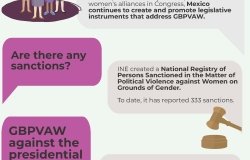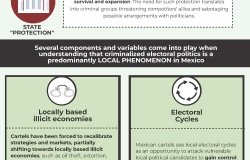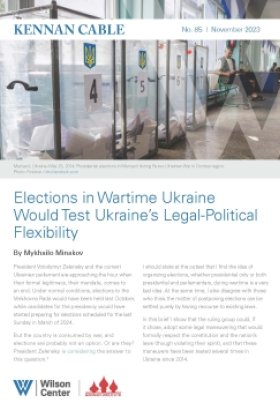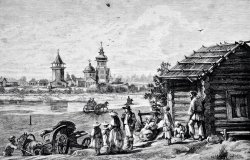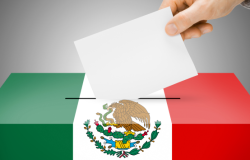Islamists Stumble in Egypt and Tunisia
Egypt and Tunisia have “traveled the furthest on the road to democratic transformation,” according to a new paper by Adeed Dawisha, a former public policy scholar at the Woodrow Wilson International Center for Scholars. Both countries have held free and fair elections. They also formed parliaments tasked with writing new constitutions. Tunisia’s prospects for democracy, however, may be better than Egypt’s, Dawisha argues.
Egypt and Tunisia have “traveled the furthest on the road to democratic transformation,” according to a new paper by Adeed Dawisha, a former public policy scholar at the Woodrow Wilson International Center for Scholars. Both countries have held free and fair elections. They also formed parliaments tasked with writing new constitutions. But the political situations in Egypt and Tunisia are increasingly unstable. Demonstrations against the new governments “have been large and widespread, and of late have turned ominously violent,” according to Dawisha. He argues that two major factors fueled the protests ― economic anxieties and “fears that the Islamists’ fidelity to democracy is paper thin.”
Tunisia’s prospects for democracy, however, may be better than Egypt’s, Dawisha argues. Ennahda, Tunisia’s main Islamist party, rules in coalition with two secular parties and has “little choice but to be flexible.” The following are excerpts from Viewpoints 24, published by the Middle East Program.
Economic anxieties have contributed to peoples’ frustrations, as neither country can boast a leadership adept at economic management. In both countries, foreign exchange reserves are falling, and, despite constant governmental pleas, outsiders are not investing. In the two years since the revolutions erupted, the Egyptian pound lost 14 percent of its value, and a number of rating agencies cut Tunisia’s sovereign credit rating to junk status. Unemployment, particularly among the young, is rampant, and inflation is rising. It is not uncommon to see demonstrators waving bread to signify the persistent wretchedness of their lives. More than a year after coming to power with promises to alleviate the economic woes of the people, all that the Islamists can show are economies that appear to be on the verge of a downward spiral.
Beyond economic concerns, what fueled the protests in Egypt and Tunisia were mounting fears that the Islamists’ fidelity to democratic principles is paper thin. Yet a closer look suggests some palpable variations in the performance of the ruling Islamists in the two countries so far. On a number of fronts, Tunisia’s Islamist party, Ennahda, seemed to be the more flexible and more willing to compromise. On the other hand, Egypt’s victorious Islamists, be they members of the mainstream Muslim Brotherhood or the puritanical Salafist creed, have proved to be less open to the proposition that politics is the art of compromise.
Civil society leaders in Egypt have every reason to fear the direction that President Muhammad Morsi and his Islamists have taken Egypt over the last 12 months or so. Morsi himself seems susceptible to authoritarian proclivities. Last November, he stunned Egyptians by unilaterally decreeing new powers for himself, and, a month later, he put a new and contentious constitution to a snap referendum, leaving no time for public debate.
Indeed, the whole episode of the writing of this constitution and its provisions revealed the absolute determination of Egypt’s Islamists to include in the conversation only those who shared their vision. Almost all non-Islamist members left the committee that was entrusted with writing the constitution, complaining that their opinions and objections were constantly and dependably dismissed. That left the constitution in the hands of the Islamists who ended up producing a document that many human rights groups described as flawed. It, for example, gives Al-Azhar, Egypt’s center of Islamic learning, the right to intrude in the law-making process, and it excludes religions not belonging to the Abrahamic tradition from practicing their faith. Certain provisions could easily be used by Islamists to restrict the rights of women, and others would limit freedom of expression. There was no mistaking the heavy hand of Egypt’s Islamists.
Tunisia’s case, however, is rather different. To begin with, the current president is not an Islamist, but a member of one of the two secular parties that entered into a governing coalition with Ennahda. As for writing a new constitution, the process could not be any more different than that of Egypt. An elected Constituent Assembly produced a constitutional document in August 2012, but, rather than ramming it through with a quick vote, they presented it as a first draft and opened it to public debate, accepting comments not only from domestic, but also international organizations. This led to a revised second draft, submitted in November 2012, which is still in the public domain. The final draft, to be completed by April 27, will undoubtedly be a better document than that of Egypt in matters of freedom of expression, freedom of thought and belief, and women’s rights…
After the early exuberance that accompanied the “Arab Spring,” it is now patently clear that getting rid of tyrants is but the first fledgling step toward a democratic future. Of all the Arab states that experienced the second Arab awakening, the best chances for an eventual transformation to democracy lie with the Islamists in Tunisia and Egypt. But for this outcome to be realized, those Islamists need to work within the democratic rules of the game, and these rules are not confined solely to winning free and fair elections. Democracy demands a liberal disposition; a tolerance for minority rights and views; and a willingness to negotiate, compromise, and when necessary make concessions for the political process to proceed. In Egypt’s case, the odds against this happening are pretty long. In Tunisia, the odds are better, but to a large extent that is because Ennahda had to enter a post-election coalition partnership with secular parties. For the sake of democracy, one very much hopes that the same institutional arrangements would accrue in the wake of the coming parliamentary election later this year…
Click here for the full text.
Adeed Dawisha is a former public policy scholar at the Woodrow Wilson International Center for Scholars. He is currently a distinguished professor of political science at Miami University, Ohio.
Related Program

The Islamists
Learn more about Hamas and how it relates to similarly aligned organizations throughout the region. Read more


